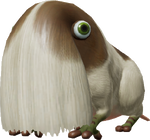Numbouse family: Difference between revisions
(→Names in other languages: I organized the list of names) |
Tag: Mobile edit |
||
| (7 intermediate revisions by 4 users not shown) | |||
| Line 1: | Line 1: | ||
{{game icons|p3=y|p4=y}} | {{game icons|p3=y|p4=y}} | ||
The '''numbouse family''' is a family of rodent-like creatures introduced in {{p3}}, although the family went unclassified until {{p3d}}. Members are known for their [[Electricity|electric]] powers they use for defense. It contains only one member, the [[Bearded Amprat]] | The '''numbouse family''' is a family of rodent-like creatures introduced in {{p3}}, although the family went unclassified until {{p3d}}. Members are known for their [[Electricity|electric]] powers they use for defense. It contains only one member, the [[Bearded Amprat]], which belongs to the ''Porcellus'' genus. | ||
==Members== | ==Members== | ||
===Bearded Amprat=== | ===Bearded Amprat=== | ||
[[File: | [[File:Pikmin Garden Bearded Amprat render.png|left|150px]] | ||
{{main|Bearded Amprat}} | {{main|Bearded Amprat}} | ||
The Bearded Amprat resembles a small white guinea pig with large brown spots on its face and back. Their head is rounded with small eyes in the front and no apparent ears. As their name implies, their faces are draped in large amounts of long, straight hair which give their face a slight resemblance to a skull. It has four, small, | |||
Scientific name: ''Porcellus barbavolta'' | |||
The Bearded Amprat resembles a small white guinea pig with large brown spots on its face and back. Their head is rounded with small eyes in the front and no apparent ears. As their name implies, their faces are draped in large amounts of long, straight hair which give their face a slight resemblance to a skull. It has four, small, rodent feet which it uses to move around and to grab prey. Unlike the rest of its body, the feet are green with brown tips on the toes, which lack claws. Its body ends in a few small brown spots and a skinny, rodent tail. | |||
{{clear}} | {{clear}} | ||
| Line 13: | Line 16: | ||
The family name ''Numbouse'' is derived from the word "numb", from their ability to paralyze Pikmin, and "mouse", from their rodent-like appearance. | The family name ''Numbouse'' is derived from the word "numb", from their ability to paralyze Pikmin, and "mouse", from their rodent-like appearance. | ||
The genus ''Porcellus'' is the | The genus ''Porcellus'' is derived from the scientific name for {{w|guinea pig}}s, ''Cavia porcellus'', which the Bearded Amprat is similar to. | ||
===Names in other languages=== | ===Names in other languages=== | ||
| Line 32: | Line 35: | ||
|DutN = | |DutN = | ||
|Fra = fulguro porcellidés | |Fra = fulguro porcellidés | ||
|FraM = | |FraM = Lightning guinea pigs | ||
|FraN = The name is a portmanteau of ''"fulgur"'' (Latin for lightning) and ''"Cavia porcellus"'' (the guinea pig's scientific name) | |FraN = The name is a portmanteau of ''"fulgur"'' (Latin for lightning) and ''"Cavia porcellus"'' (the guinea pig's scientific name) | ||
|Ger = Britzelnager | |Ger = Britzelnager | ||
|GerM = | |GerM = Sparkle rodent | ||
|GerN = | |GerN = ''Britzel'' is a German onomatopoeia for the noise of electricity | ||
|Ita = Caviidi electrici | |Ita = Caviidi electrici | ||
|ItaM = A | |ItaM = | ||
|ItaN = A Latin-sounding pun on ''cavi elettrici'' (electric cables) | |||
|Kor = 마비쥐 과 | |Kor = 마비쥐 과 | ||
|KorR = | |KorR = | ||
Latest revision as of 06:41, October 29, 2024
The numbouse family is a family of rodent-like creatures introduced in Pikmin 3, although the family went unclassified until Pikmin 3 Deluxe. Members are known for their electric powers they use for defense. It contains only one member, the Bearded Amprat, which belongs to the Porcellus genus.
Members[edit]
Bearded Amprat[edit]
- Main article: Bearded Amprat.
Scientific name: Porcellus barbavolta
The Bearded Amprat resembles a small white guinea pig with large brown spots on its face and back. Their head is rounded with small eyes in the front and no apparent ears. As their name implies, their faces are draped in large amounts of long, straight hair which give their face a slight resemblance to a skull. It has four, small, rodent feet which it uses to move around and to grab prey. Unlike the rest of its body, the feet are green with brown tips on the toes, which lack claws. Its body ends in a few small brown spots and a skinny, rodent tail.
Naming[edit]
The family name Numbouse is derived from the word "numb", from their ability to paralyze Pikmin, and "mouse", from their rodent-like appearance.
The genus Porcellus is derived from the scientific name for guinea pigs, Cavia porcellus, which the Bearded Amprat is similar to.
Names in other languages[edit]
|
The following article or section is in need of assistance from someone who plays Pikmin 3 Deluxe. |
| Language | Name | Meaning | Notes |
|---|---|---|---|
| シビレネズミ科? Shibire Nezumi Ka |
Numbness mouse family | ||
(traditional) |
麻痺鼠科 | ||
| fulguro porcellidés | Lightning guinea pigs | The name is a portmanteau of "fulgur" (Latin for lightning) and "Cavia porcellus" (the guinea pig's scientific name) | |
| Britzelnager | Sparkle rodent | Britzel is a German onomatopoeia for the noise of electricity | |
| Caviidi electrici | A Latin-sounding pun on cavi elettrici (electric cables) | ||
| 마비쥐 과 | |||
| Eletricavídeos | Eletricaviidae | The name is a portmanteau of "elétrico" (electric) and "cavídeos" (cavy) The suffix "-ídeos" (-idae) is used for naming animal family names | |
| Estatidentios |
